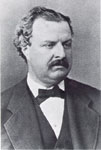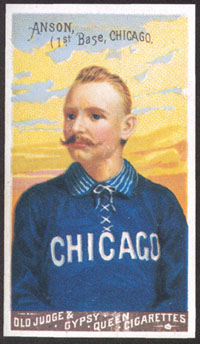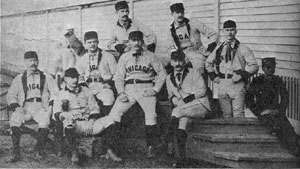 The weakness of the National Association was pounced upon by Chicago White Stockings owner William A. Hulbert. Hulbert was a pitiless coal baron, determined not only to have the best team, but the most profitable one as well. His corporate perspective placed professional baseball within a greater network of enterprise -- aligned with transit interests, hotels, grounds firms, and sporting goods suppliers.1
The weakness of the National Association was pounced upon by Chicago White Stockings owner William A. Hulbert. Hulbert was a pitiless coal baron, determined not only to have the best team, but the most profitable one as well. His corporate perspective placed professional baseball within a greater network of enterprise -- aligned with transit interests, hotels, grounds firms, and sporting goods suppliers.1
 First, Hulbert needed a powerful team. He secretly contracted Phiadelphia's star, Adrian "Cap" Anson, and four Boston players, including Al Spalding. Rendering any objections of fellow National Association owners moot, Hulbert established a new league headed by himself. In February of 1876 he met with seven other like-minded owners -- determined to wield greater control over the sport -- from Boston, Cincinnai, St. Louis, Hartford, New York, Philadelphia, and Louisville. Each charter team of the National League was thus established in cities with populations of at least 75,000 potential consumers, and League rules prohibited more than one team per city, thus preserving the territorial integrity of each franchise. A central League office was established, with well-known Connecticut politician Morgan Bulkeley as president, to maintain records, make rule changes, manage umpires, and adjudicate disagreements.
First, Hulbert needed a powerful team. He secretly contracted Phiadelphia's star, Adrian "Cap" Anson, and four Boston players, including Al Spalding. Rendering any objections of fellow National Association owners moot, Hulbert established a new league headed by himself. In February of 1876 he met with seven other like-minded owners -- determined to wield greater control over the sport -- from Boston, Cincinnai, St. Louis, Hartford, New York, Philadelphia, and Louisville. Each charter team of the National League was thus established in cities with populations of at least 75,000 potential consumers, and League rules prohibited more than one team per city, thus preserving the territorial integrity of each franchise. A central League office was established, with well-known Connecticut politician Morgan Bulkeley as president, to maintain records, make rule changes, manage umpires, and adjudicate disagreements.
Publically, the National League owners claimed to be embarking on a reform mission to reclaim baseball from the depths it had reached under the National Association. Stricter rules were certainly established: National League players were forbidden to drink both on and off the field, no alcohol was served at games, gambling was barred, Sunday games were abolished, and ticket prices were set at 50 cents. However, the pious claims of NL owners were considered dubious even then (New York Clipper, "National League of Professional Clubs: A Startling Coup d'Etat"2), and proved little more than a simple front for advanced institutional power
The power had shifted resoundingly from the players to the owners. Hulbert argued, "it is ridiculous to pay ballplayers $2,000 a year. Especially when the $800 boys often do just as well."3 The owners then instituted a reserve clause, by contract restricing five players on each team to play for that team only, in perpetuity. A player's complaint could get him fired and blacklisted from the league, effectively ending his career.
1 Robert F. Burk, Never Just a Game: Players, Owners, and American Baseball to 1920 (Chapel Hill: UNC Press, 1994) 51.
2 "National League of Professional Clubs," New York Clipper 12 February 1876: 96-9, qtd. in Dean A Sullivan, ed., Early Innings: A Documentary History of Baseball, 1825-1909 (Lincoln: University of Nebraska Press, 1995) 161-9.
3 Geoffrey C. Ward, Baseball: An Illustrated History (New York: Knopf, 1994) 24.
 William Hulbert
William Hulbert
 William Hulbert
William Hulbert
